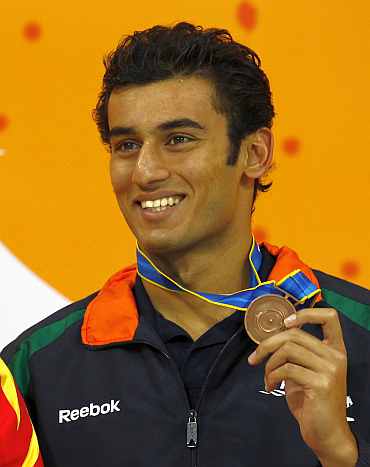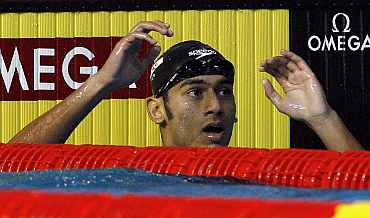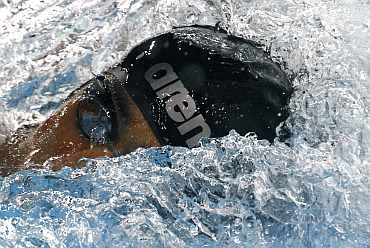 | « Back to article | Print this article |
Khade won bonze at the Asiad
In a sport which rarely gives India any highs to talk about in any given year, 19-year-old Virdhawal Khade produced a performance to remember by ending Indian swimming's 24-year-old medal drought in the Asian Games, holding out promise for a better future. 
The strapping six-footer from Kolhapur clinched a bronze in the 50m butterfly event of the Asian Games in Guangzhou, the India's second swimming medal at the event after Khazan Singh's 200m butterfly.
However, there was disappointment for the Indians in the other multi-discipline sporting extravaganza in Commonwealth Games. The Indian contingent had to bow to Australian, English and Canadian might, even as they advanced to finals in some events.
But even there, para-swimmer Prasanta Karmakar became the first Indian swimmer to fetch a medal by winning a bronze in the 50m freestyle event.
The year will be remembered for the feats of Khade
There were controversies as well, when the infamous 'Delhi belly' became the buzzword during the swimming event of the Commonwealth Games with foreign contingents alleging water contamination at the Dr Shyama Prasad Mukherjee Aquatics Complex.
The Indian swimming contingent had its share of problems outside the pool to deal when three swimmers, two of whom part of the Commonwealth Games squad -- Richa Mishra and Jyotsana Pansare, tested positive for methylhexaneamine, a stimulant banned by the World Anti-Doping Agency (WADA).
Later, the agency lifted the suspension, taking into cognizance the fact that the World Anti-Doping Agency had approved the shifting of MHA from the list of non-specified substances to specified substances.
The Asian Games gave the much-needed boost to the sport through Khade but the Swimming Federation of India (SFI) drew flak after it came to light that China 'sponsored' India's women's water polo team in a full-expense paid trip to Guangzhou so that the discipline had four teams, the minimum requirement for a competition to be held.
As expected, the Indian women's team finished at the bottom after conceding 96 goals in three matches and scoring just six as hosts China won the gold, while Kazakhstan and Uzbekistan bagged the silver and bronze respectively. But the year will be remembered for the feats of Khade and Karmakar at the Asian Games and Commonwealth Games respectively.
'My father demanded that I win gold in butterfly'
Khade's show was the highlight of the otherwise mediocre Indian performance in the Asian Games aquatics competition.
Considered one of the best in his age group, Khade emulated Khazan's feat of 1986 Asian Games in Seoul.
A day after the heartbreak of the 50m freestyle final, when he lost a medal by a whisker (0.03s), Khade inspired by his father's words -- clocked 24.31s for a third-place finish at the Aoti Aquatics Centre.
China's Jiawei Zhou (23.66) won the gold while the silver went to Japan's Masayuki Kishida (24.13).
"My father demanded that I win gold in butterfly but I won a bronze. I guess it's good enough," said Khade.
In fact, Khade has been on a fairytale run in the past two years. He became the youngest Indian -- at 15 to qualify for the Beijing Olympics in 2008.
Khade holds five National records in 50m freestyle (22.55s), 100m freestyle (49.47), 200m freestyle (49.86), 50m butterfly (24.14) and 100m butterfly (52.77) and in 2008 he was the first Indian to break into the FINA world rankings in the 50m butterfly when he was ranked 50.
Khade has the potential to win an Olympic medal
In the Asian championship in 2009, he won a gold and three bronze medals and in the Asian age group championship, he won four golds and in the preceding year at the Commonwealth Youth Games, he won three gold medals.
At the Commonwealth Games, Khade did make it to the final of the 50m butterfly as he swam with top timings in all his events and rated his sixth place in the 50m butterfly semis as his best ever.
His personal coach Nihar Amin believes Khade has the potential to earn India an Olympic medal if not in 2012, then in 2016.
"Age is on his side and he is only getting better," said the Bangalore-based Amin, who incidentally also coached Karmakar.



